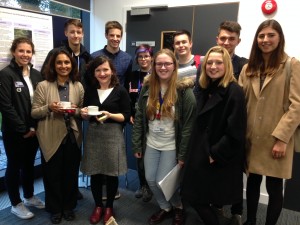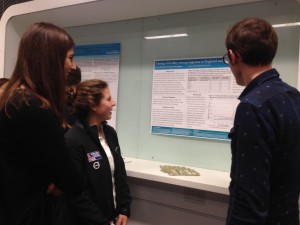The Problem with Immigration Street: ESRC Social Sciences Festival 2015
The ESRC Social Sciences Festival 2015 was host to a two-part event aimed at debunking the truth, and myths, perpetuated by the media on immigration, including the Channel 4 programme, Immigration Street. Second-year BSc Population & Geography student and Faculty Officer for Social, Human & Mathematical Sciences, Bradley Tombleson, describes the event.
‘True Toll of Mass Migration on UK Life’ and ‘The ‘Swarm’ on our Streets’ are headlines that were used by prominent tabloids throughout the summer of 2015 in an attempt to convey particular messages to the British public about the growth of new migrant communities in the UK. Especially owing to the ongoing Syrian refugee crisis, migration has undoubtedly been a key feature of everyday conversation in recent months.
In 2014, Channel 4 broadcast ‘Immigration Street’, a TV documentary that focused on migrant families living in Derby Road in Southampton. The documentary claimed that over 30 different nationalities are represented on this street – the foreign-born population had increased particularly over the last few years – and so the aims to determine residents’ opinions of these trends. Naturally a great deal of opposing views were provoked, many of which were not based on facts.
With migration stories and debates dominating media headlines and causing a variety of emotions amongst many people, it is essential to clarify facts, to distinguish between truth and myth.
This was the aim of the event that took place at the University of Southampton on 11 November 2015 as part of the Economic and Social Research Council (ESRC) Festival of Social Science (7-14 November 2015).
The two-part event was co-organised by Dr Bindi Shah (Lecturer in Sociology) and Dr Julie Vullnetari (Lecturer in Human Geography) and was supported by University of Southampton staff and students.
The afternoon began with a well-informed and thought-provoking debate about migration between two opposing teams of A-Level students from Richard Taunton Sixth Form and Barton Peveril College. The motion: ‘migration has a positive impact on the UK society’.
The debate was skilfully chaired by a Sixth Form student, with the assistance of Jonathan Kirk from the Southampton Debating Society. Both teams had done a fantastic job at researching the topic, and put their arguments forward convincingly and eloquently. They successfully fielded some tough questions from the audience; in the end, the overwhelming majority voted to carry the motion.
Some of these discussions were continued over tea/coffee/refreshments during the break that followed. This also provided an opportunity for the participants to learn more about the research that is carried out at the University of Southampton on migration-related topics. This research was presented in the form of posters and staff, doctoral and post-doctoral researchers from a range of disciplines were at hand to discuss their findings through examples and explanations.
Poster topics ranged from the interaction between climate change, migration, remittances and gender in India; to migrant children, and elderly populations ‘left behind’ in China; to the fertility and welfare status of migrants in the UK; conversations about migrants on social media; and transnational migration of artists from Africa. There was a great deal of interest from all attendees, especially the A-Level students, and the posters triggered some passionate conversations
Upon reconvening, a roundtable discussion of Southampton-based agencies and practitioners brought to light some of the day-to-day struggles that individual migrants and especially refugees and asylum seekers face.
First to present was Jenny Cuffe, who volunteers for the Southampton and Winchester Visitors’ Group (SWVG). Jenny felt that working for the SWVG has enabled her to view contemporary migration issues through a lens that very few people have access to. She gave a powerful account of the journey a Syrian refugee had made in order to reach the UK, describing some of the horrors of everyday life in war-torn Syria, the perilous journey across Northern Africa and Europe, and the insecurity and the marginalisation experienced in the UK, especially due to the poor treatment by the British Home Office.
Next to present was Paul Leppitt from CLEAR – a voluntary organisation that supports migrants and refugees with the transition into UK society.
Paul started with an overview of the refugee situation worldwide and then went on to talk about refugees and asylum seekers in the UK, before focusing locally on the Southampton experience. From his first-hand experience the audience was able to get a glimpse of some of the struggles that refugees and asylum seekers face in Southampton and the UK more broadly, and CLEAR’s work in supporting these individuals to cope financially or socially. It is not uncommon for refugees to become destitute and Paul expressed concerns about their fate in the face of severe cuts to local and national budgets to help such work, as well as increasingly tightened regulations around asylum and leave to remain.
Panellist Iain Woodhouse, Unite official based in Southampton, was next. Starting with a personal migration experience, Ian went on to talk about the benefits that society accrues when the rights of all workers are protected. He voiced concerns about some of the public debates dividing the workers with the risk of pitching local workers against non-migrants.
Through real-life examples from first-hand experience, Ian illustrated the valuable work that Unite does to inform workers, including migrant workers, of their rights, and fight for their rights, against exploitation, whether related to pay or working conditions.
The final speaker was Ilona Kurzak, a Polish migrant living in Southampton, who related her personal experiences thus casting light to the diversity of migrants in Southampton and around the world. Ilona’s trajectory differs significantly from the harrowing stories of refugees. She moved to the UK following the accession of Poland (and other so-called Eastern European countries – A8) to the EU in 2004. She considered her move as one of choice, given she had previously lived in other EU countries. Therefore, she could make a conscious effort to learn the language, to learn about her occupational rights upon settling here and she could join unions (as discussed by Iain) to prevent her from being exploited by employers.
Ilona also volunteers through the Southampton-based organisation EU Welcome which provides information for newcomers and signposts EU migrants living in Southampton to local services, thus supporting a smoother integration into local society.
Parallel to these efforts to integrate into Southampton and UK society, Ilona and other migrants like her also retain transnational networks whether with their country of origin, or based on skills and profession. An example of the latter is the European Network that links professionals around Europe.
There were key take-home messages that each panellist wished to emphasise:
- It is all too easy to assume that what is portrayed by the media is true; assumptions are made without enough information for judgement.
- Lack of, or limited information, leads to misconceptions, but also to misuse of terminology. For instance, words such as ‘refugee’ and ‘asylum seeker’ have taken a negative meaning when reported by certain media, thus undermining the humanitarian response to individuals seeking sanctuary, safety and refuge. Panellists also identified a lack of distinction between ‘migrant’, ‘refugee’ and ‘asylum seeker’ and urged for a greater understanding as they claimed this contributes to the toxic stigma that is attached to certain media headlines.
Overall, the purpose of this event was to open social sciences to the wider public – beyond the traditional audience of staff and students at the University – through actively engaging the public, especially the A-level students in this case. This aim was certainly achieved. Beyond becoming more well-informed about migration, through their own research or from the interaction with students and staff during the poster session, students also had an opportunity to practice and strengthen their debating and public speaking skills.
One of the teachers considered the event ‘unique’ in that it gave students an opportunity to experience university life first-hand: “[Our] students often get chances to visit universities and observe things at Open Days etc but they rarely get a chance to actually participate in something. So what you provided was rather unique. […] it was very useful for them to see a little bit of what university life is actually like. (Especially coping with the challenging questions).”
On behalf of the organising team, a big Thank You to the A-level students and their teachers: of Richard Taunton, Barton Peveril College and Sixth Form Debating Society at Bay House School in Gosport; to our guest panellists for taking time out of their busy life to come and share their thoughts and experiences with us; to the undergraduate students at Southampton who helped out with the organisation and participated in the audience; to the members of staff and postgraduate & post-doctoral researchers for their enthusiasm and dedication; and, last but not least, to Janice from Southampton Education School and Alex from the Faculty, whose support was crucial. The event was co-sponsored by the ESRC and the University’s Social Sciences department, for which we are grateful.
The staff-student collaboration that underpinned this event showed the great potential that exists in such initiatives. We all enjoyed being part of it!
Bradley Tombleson
Second-year BSc Population & Geography student, and Faculty Officer for Social, Human and Mathematical Sciences



Leave a Reply
You must be logged in to post a comment.